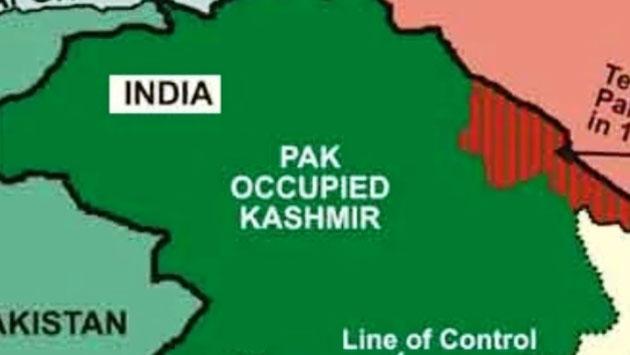08 Nov 2024 - {{hitsCtrl.values.hits}}
 The government of POJK has dealt a severe blow to the fundamental rights of its citizens with the recent amendment to the Criminal Code Ordinance of 1860. By introducing Section 505-C, the authorities have granted themselves sweeping powers to silence dissent and suppress any criticism of the government and its officials. This blatant attack on freedom of expression marks a dramatic step backwards for democracy, betraying the very people the government is meant to serve. Passed unanimously by the POJK Legislative Assembly, the amendment is a desperate move born of a deep fear of accountability.
The government of POJK has dealt a severe blow to the fundamental rights of its citizens with the recent amendment to the Criminal Code Ordinance of 1860. By introducing Section 505-C, the authorities have granted themselves sweeping powers to silence dissent and suppress any criticism of the government and its officials. This blatant attack on freedom of expression marks a dramatic step backwards for democracy, betraying the very people the government is meant to serve. Passed unanimously by the POJK Legislative Assembly, the amendment is a desperate move born of a deep fear of accountability.
Under the guise of "protecting the community," the amendment expands the definition of "community" to include bureaucrats, public servants, and the political elite, effectively placing them above reproach and beyond the reach of public scrutiny. This cynical attempt to shield the powerful from rightful criticism reflects an authoritarian agenda aimed at silencing dissent.
Legal experts, journalists, and political figures have condemned the amendment in the strongest terms. Raja Sajjad Ahmed Khan, President of the POJK Supreme Court Bar Association, has rightly called it an "infringement of fundamental rights and freedom of expression." He has urged for the formation of a high-level committee to challenge this clear violation of civil liberties in the courts. Tariq Farooq, Secretary General of the POJK chapter of the Pakistan Muslim League Nawaz, also denounced the amendment as "malicious" and "against the fundamental human right of expression," calling on lawmakers to resist the measure.
The Central Union of Journalists (CUJ) in POJK has taken a strong stand against the amendment, demanding its repeal within 10 days. Should the government fail to act, widespread protests will be staged in a powerful show of resistance from the media community, which views this as a direct attack on their ability to report freely. Former assembly candidate Syed Ismail Hussain Shah condemned the amendment as a "heinous conspiracy to silence journalists" and warned that POJK was becoming a "colonial region where human values are being killed day by day."
The implications of this draconian measure are far-reaching and deeply alarming. By empowering the government to prosecute individuals merely for criticizing the authorities, the amendment effectively strips citizens of their most basic democratic rights. It directly contradicts the POJK Interim Constitution of 1974, which guarantees freedom of expression. Journalists, vital to holding the government accountable, will face increasing scrutiny and intimidation, while political activists who challenge the status quo will be vulnerable to repressive legal action. The chilling effect of this law will stifle public discourse, curbing the free exchange of ideas and weakening democratic engagement in the region.
This move is part of a broader pattern of authoritarian behavior from the POJK government, which appears determined to consolidate power at the expense of its people's rights. By shielding the political elite and the bureaucracy from criticism, the authorities are fostering a climate of fear and self-censorship, where transparency and accountability are silenced in favor of political control.
The POJK government's heavy-handed tactics mirror a larger trend within Pakistan, where the military-intelligence complex has long repressed political opposition and independent media voices. For decades, the Pakistani deep state has sought to maintain its grip on power through arbitrary detentions, censorship, and the suppression of free speech. The POJK amendment is just the latest extension of this repressive mindset, further entrenching authoritarian rule and undermining the region's fledgling democracy.
The people of POJK, and of Pakistan more broadly, have suffered under the yoke of deep state-driven authoritarianism for far too long. Their struggle for true democracy and fundamental freedoms will remain an uphill battle unless those in power are held accountable. The recent amendment to Section 505-C is a clear affront to the democratic aspirations of the people and an attempt to erase the rights and freedoms they have long fought for.
Now, more than ever, citizens must demand action. POJK's government must immediately rescind this amendment before it leads the region down a path of further repression. If the government does not heed the calls for justice, POJK will risk becoming a dystopian reality where free speech is crushed and the foundations of democracy are destroyed.
The people of POJK deserve a government that respects their fundamental rights, upholds the rule of law, and is accountable to the people it serves. The amendment to Section 505-C is a betrayal of these principles, and unless it is repealed, the region will continue to spiral into a dark future of authoritarian rule and suppressed freedoms. The time for the POJK government to act is now—before the very essence of democratic governance is lost to oppression.
04 Dec 2024 22 minute ago
04 Dec 2024 2 hours ago
04 Dec 2024 2 hours ago
04 Dec 2024 2 hours ago
04 Dec 2024 3 hours ago